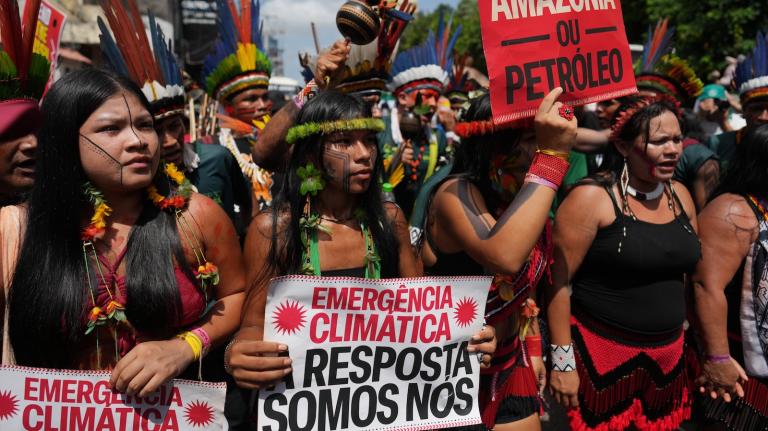Dear Umbra,
I know you don’t make up questions, but in this instance I think it’s acceptable. Could you suggest a collection of resources on climate change? I think it might help us all get better educated on this vital topic. Even if they don’t spend an hour of their Earth Day sifting through the sites, it’ll be good for readers to have for later reference — you know, Clip-N-Save. (By the way, you’ve been awfully serious lately. Remember: “Gloom and doom with a sense of humor.” Get your act together.)
Happy Earth Day (almost),
Umbra Fisk
Dearest Umbra,
Great idea! Plus it fits well with this month’s “Climate Change Until We’re All Deranged” theme. How better to celebrate Earth Day than to move toward understanding and perhaps saving our complex planet? Cue violins and cicadas.

You’re talking to yourself again, dear.
OK, peeps: Here’s our education compendium, with which we will be able to answer all questions, refute all refuseniks, wittily quip at the blithe ditz, equip for the political pitch. I’m obsessed, I want to make you obsessed, the situation is dire, the horse is out of the barn, our children will be living a nightmare. Whee! I’m a barrel of laughs these days.
If you are at the absolute beginning of understanding concepts such as what global warming is, and why the ozone hole is distinct from it: the Union of Concerned Scientists maintains a Global Warming 101 site, and I start you with their FAQs. The Exploratorium Museum in San Francisco has a nicely arranged primer with basic information as well as introductions to issues in the atmosphere, cryosphere, hydrosphere, and biosphere (and neat charts, which I love). And to throw in a government body, the National Oceanic and Atmospheric Administration’s National Climatic Data Center also has nice FAQs, with good links. They start going into slightly technical topics — things like “reduced diurnal temperature range” — a good way to figure out which autodidactic technique is next for you.

Change your mind.
Photo: iStockphoto.
Perhaps you comprehend the very basic vocabulary and would like to learn specifics — for example, how thermal expansion is connected to rising sea levels, or why water vapor isn’t blamed for more problems. I’ve pointed to the FAQ from the UNEP-WMO, PDQ RSPDW site before (just kidding about most of those — that would actually be the U.N. Environment Program’s FAQ page), and it directly answers the latter question. Here is a very dense site from the Carbon Dioxide Information Analysis Center, with a FAQ page full of questions ranging from “What is the greenhouse effect?” to “Where can I find information on the use of liquefied carbon dioxide in the extraction of alkaloids from plant materials?” (I wish I had found this page a month ago. Any of you who have sent me a climate-change question, including any related to automobiles, are likely to find it here. From Actual Scientists! They’ll answer your question, too.)
If you want to Dork Out and read about the scientific consensus on global warming, spend some time with the Intergovernmental Panel on Climate Change. Their site is a bit daunting at first. Over on the right side is the Third Assessment Report — cited everywhere as the IPCC-TAR — which is actually made up of four dense reports. Just try them. I’ve looked through them quite a bit recently, and gotten over my assumption that it would be too hard to distill the points. Now I just have to resist emailing terrifying charts to friends and family. It’s actually fairly easy to pick through the chapter headings and find the summaries that you want to see, or the debates. Those of you who are still skeptical will like these pages, because it is clear that science is in action, examining and re-examining all data with an eye to finding errors. (But don’t start with the IPCC reports if technical climate language is over your head.)
As you go to the sites I’ve mentioned, they’ll lead you to other good links. Such as the RealClimate blog, the NOAA Paleoclimatology site, the World Data Center for Greenhouse Gases, the Natural Resources Defense Council, etc. You’ll find the best ones for you.
Listen in Windows Media.
Listen in RealPlayer.
Finally, I’d like to make the plug for Field Notes From a Catastrophe: Man, Nature, and Climate Change, by Elizabeth Kolbert. It costs $23 in hardcover, free at the library. Grist has reviewed it, and interviewed her, so we’re plugging it fairly well already, but I’d like to pipe in as your advice columnist. If you read this book, you’ll end up with a fistful of excellent stories about climate change. You’ll learn how to explain confusing science in very simple language, you’ll get good examples of impacts ’round the world, and you’ll have an idea what is happening politically. All without slogging: The book is well-written, and relatively short. Try it.
Still not funny this week.
Apologetically,
Umbra


